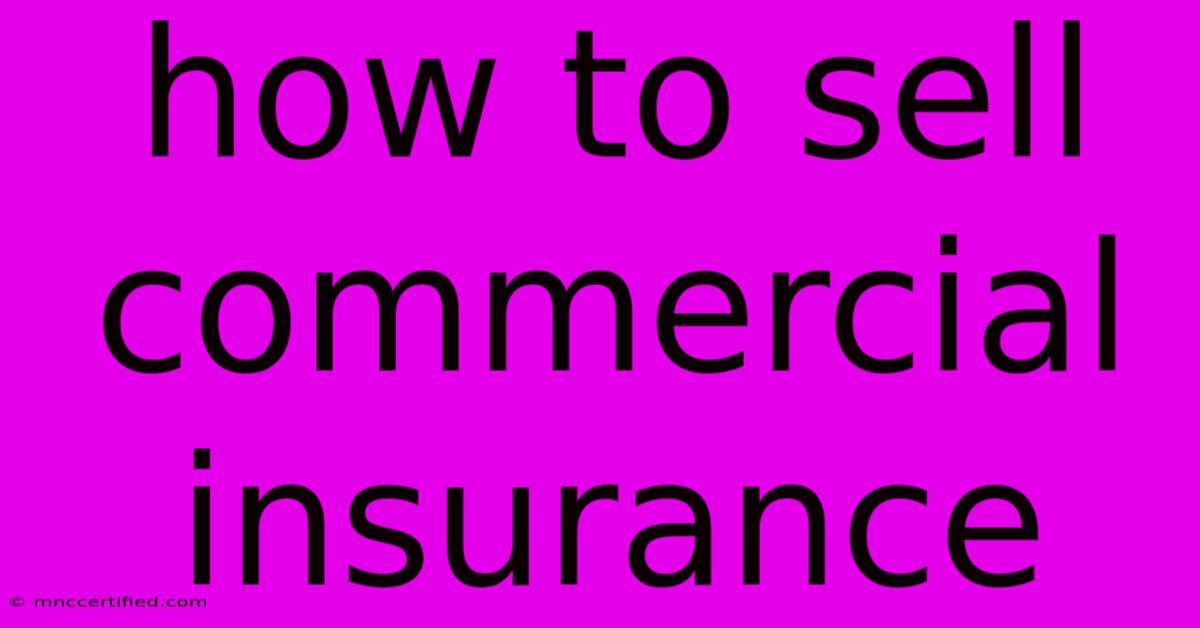How To Sell Commercial Insurance

Table of Contents
How to Sell Commercial Insurance: A Comprehensive Guide
Selling commercial insurance requires a different approach than selling personal lines. It demands a deeper understanding of business needs, risk assessment, and relationship building. This comprehensive guide will equip you with the strategies and knowledge to succeed in this lucrative market.
Understanding the Commercial Insurance Landscape
Before diving into sales tactics, it's crucial to understand the commercial insurance landscape. This isn't just about selling policies; it's about understanding the unique needs and vulnerabilities of businesses.
Types of Commercial Insurance: Knowing Your Products
Familiarize yourself with the various types of commercial insurance policies you'll be selling. This includes but isn't limited to:
- General Liability Insurance: Protects businesses from financial losses due to third-party bodily injury or property damage claims. This is a fundamental policy for most businesses.
- Professional Liability Insurance (Errors & Omissions): Covers claims of negligence or mistakes made by professionals in the course of their work. Crucial for consultants, lawyers, and doctors.
- Workers' Compensation Insurance: Protects employees injured on the job. A legal requirement in many jurisdictions.
- Commercial Auto Insurance: Covers vehicles owned and used by the business.
- Commercial Property Insurance: Protects business buildings and their contents from damage or loss.
- Business Interruption Insurance: Covers lost income due to unforeseen events that disrupt business operations.
- Cyber Liability Insurance: Protects against data breaches and cyberattacks – increasingly vital in today's digital world.
Understanding the nuances of each policy will allow you to effectively tailor your sales pitch to specific client needs.
Identifying Your Target Market: Niche Down for Success
Don't try to be everything to everyone. Focusing on a specific niche allows you to become an expert in that area, attracting more qualified leads. Consider specializing in:
- Small businesses: Restaurants, retail shops, etc.
- Medium-sized businesses: Manufacturing, technology companies, etc.
- Large corporations: Requires specialized expertise and potentially a team.
- Specific industries: Construction, healthcare, technology, etc.
Niche specialization allows for targeted marketing and more effective communication with potential clients.
Mastering the Art of Commercial Insurance Sales
Now that you understand the products and target market, let's explore the sales process:
1. Prospecting and Lead Generation: Finding Your Ideal Clients
Effective lead generation is crucial. Utilize a variety of strategies:
- Networking: Attend industry events and build relationships.
- Online marketing: Utilize SEO, social media marketing, and content marketing to attract potential clients. Keyword research is key here. Think about terms like "commercial insurance broker near me," "best commercial insurance rates," and "commercial insurance quotes."
- Referrals: Leverage existing client relationships to generate new leads.
- Cold calling (with a strategic approach): This can be effective if done with a personalized script and thorough research.
2. Needs Analysis: Understanding Your Client's Risks
This stage is paramount. Ask detailed questions to understand:
- The nature of their business: What products or services do they offer?
- Their revenue and assets: To determine appropriate coverage amounts.
- Their current insurance coverage: Are there gaps in their protection?
- Their risk profile: What are their biggest potential liabilities?
Thorough risk assessment allows you to propose a tailored insurance solution.
3. Presenting Your Solution: Crafting a Compelling Proposal
Based on your needs analysis, present a customized proposal that clearly outlines:
- The risks identified: Highlight the potential vulnerabilities of their business.
- The recommended coverage: Explain how the policy addresses those risks.
- The policy's terms and conditions: Transparency is vital.
- The premium cost: Be upfront and clear about pricing.
- Value proposition: Emphasize the long-term value of protecting their business.
4. Closing the Sale and Building Long-Term Relationships
Closing the sale is about building trust and demonstrating value. Follow up regularly and provide excellent customer service. Nurturing relationships leads to renewals and referrals.
Essential Skills for Success
- Strong communication skills: Effectively convey complex information.
- Negotiation skills: Secure favorable terms for your clients.
- Problem-solving skills: Identify and address client concerns.
- Sales acumen: Master the sales process and close deals.
- Industry knowledge: Stay updated on industry trends and regulations.
Selling commercial insurance is a challenging but rewarding career. By mastering these skills and strategies, you can build a successful and thriving business. Remember, it’s not just about selling a policy; it's about building relationships and providing invaluable protection to businesses.

Thank you for visiting our website wich cover about How To Sell Commercial Insurance. We hope the information provided has been useful to you. Feel free to contact us if you have any questions or need further assistance. See you next time and dont miss to bookmark.
Featured Posts
-
Long Term Care Insurance Lincoln
Nov 21, 2024
-
18 55 An Hour Is How Much A Year
Nov 21, 2024
-
Kaplansky Insurance Fairhaven Ma
Nov 21, 2024
-
Donovan Mitchell Props Pelicans Game
Nov 21, 2024
-
Bomb Cyclone Bellevue Under Siege
Nov 21, 2024